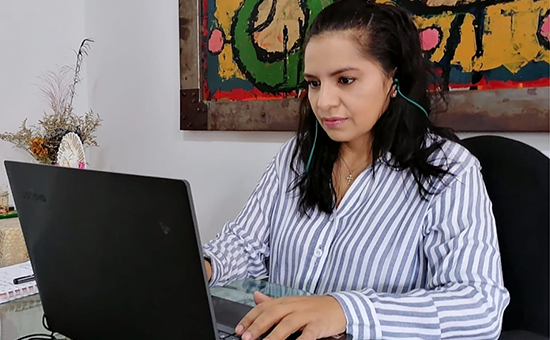
05 Feb Training of Trainers: Sharing Knowledge and Experience to Improve the Quality of Social Services in Colombia
Elka Barrios is a lawyer and a family advocate for the Colombian Family Welfare Institute (Instituto Colombiano de Bienestar Familiar or ICBF) in the Huila region. As family advocate, Elka works to prevent and protect children and adolescents against violence, and guarantee and reestablish their rights when they have been victims of violence. Being part of ICBF staff, Elka must participate in trainings and courses established in the 2020 Institutional Training Plan (PIC) to acquire new skills and strengthen the ones she already has.
Her colleague, Olga Osso, is responsible for arranging these trainings in the Huila Regional Office and for executing and reporting the trainings to the National Headquarters. However, there are three factors that negatively affect the organization and development of the training sessions:
- Insufficient financial resources. The Regional Directorate’s 2020 budget does not include funds to hire trainers for these sessions. Olga has the responsibility to find local trainers who are willing to be volunteers, and every year it is more difficult to find professionals who would consider investing their time and effort without being paid for their work.
- Low quality of workshops and trainers. As a consequence, when Olga finds a volunteer to teach the workshops, their level of specialty is not usually the one the participants would expect. For this reason, the duration and quality of the trainings do not meet the expectations of ICBF employees, who lost interest in participating in them.
- Low participation levels. Many ICBF staff members attend just one or two trainings of the PIC to check the participation requirement box but won’t attend and actively participate in all of them. Additionally, around 40 percent of ICBF’s employees are contractors for whom training is optional—the Colombian standard prioritizes and gives preference to staff over contractors.
.
To address these three problems, HRH2030 Colombia designed and proposed a training of trainers (ToT) strategy focused on developing capacities internally in the regional directorate. ICBF’s management launched an invitation to join a group called “Training Managers,” and, with a push from Olga, Elka and 13 of her colleagues expressed their interest in participating.
“I thought it would be a good opportunity to learn, grow, and improve my attitudes and skills. I could, as well, learn from my peers and share my knowledge with them,” says Elka, who admits that, at first, she felt a bit anxious and nervous about taking on a new role.
Throughout 12 sessions, the Training Managers carried out 100 percent of the activities programmed in the PIC, training 227 ICBF workers in Huila and La Guajira. Currently, Huila is the only regional direction that has complied with the totality of the PIC. Elka, who says she accepted Olga’s initial invitation with great skepticism, trained 55 colleagues in total in both regions. The 14 managers obtained excellent satisfaction evaluations from the trainees, demonstrating that ICBF staff are prepared to give good quality training to their peers. In addition, they captured the interest of 83 contractors who participated voluntarily.
Elka says that training her colleagues “was a challenge that allowed me to share with them the opportunities and strategies of the organization, and which strengthened my personal and collaborative learning through our own institutional resources.”
Because of the ToT strategy success, Elka and her colleagues will receive a formal recognition from ICBF. Although this was not their reason for participating, the recognition will help motivate the Training Managers, who are committed to continuing the trainings in the future. In this way, ICBF has managed to demonstrate that this strategy will facilitate the transfer of existing knowledge and experience within the organization by using the staff as an available resource. Thanks to this, the strategic management of training is institutionalized, guaranteeing continuous capacity building activities in the future that are sustainable and use an approach that proved to be successful among staff and contractors.
Since 2018, HRH2030 has been working to deliver quality and timely training to ICBF staff to strengthen social services. In addition to training the trainers, HRH2030 designed and implemented a collaborative and participatory learning needs identification methodology to identify key training topics. Based on this diagnosis, HRH2030 supported direct training on the identified topics to a large group of collaborators in La Guajira and Huila.
Photo: Elka Barrios is one of 14 training managers that participated in the training of training activity. Credit: HRH2030 Colombia





